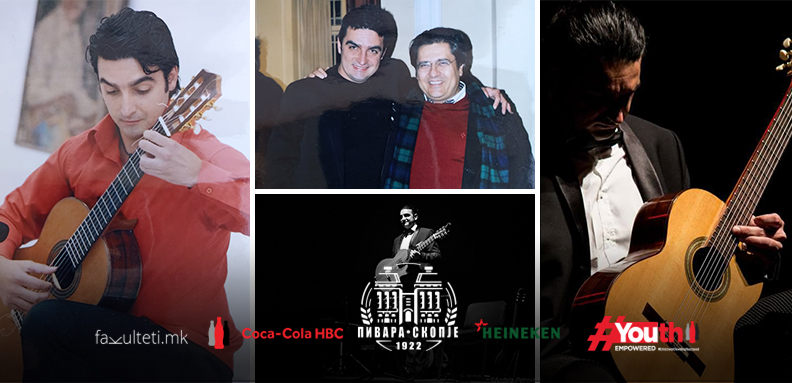





“WHEN I WAS A STUDENT” WITH PROFESSOR DARKO BAGESKI FROM THE FACULTY OF MUSIC: TO FAIL AN EXAM WAS A LUXURY AND A FINANCIAL BURDEN FOR MY PARENTS
My average was between 8 and 9, maybe there was an impact of the language barrier because I could not fully express myself as I know, but the quality of teachers, rigor and discipline in assessment were at a much higher level than in our country.
We lived in a dormitory with students from over 200 countries. We often did Balkan parties, where all sorts of things happened.
When we mention the classical guitar, we immediately think of Darko Bageski, our most successful soloist of this instrument, with a series of performances around the world. He is a professor at the Faculty of Music in Skopje, and previously was a guitar professor at the DMBUC “Ilija Nikolovski-Luj” in Skopje and many of his student guitarists have won awards at international competitions. Darko Bageski is also a soloist in many chamber orchestras, but also in symphony orchestras, for example, the Macedonian Philharmonic Orchestra. Among the many awards, he won the award from the Association of Music and Ballet Teachers of Macedonia for many years of successful pedagogical work.
– From the very beginning I wanted to grow into a soloist of classical guitar and also a pedagogue. I love both directions, but I must admit that only with a lot of effort and good life organization can they develop together in professional waters. Personally, I think that in order to be a good pedagogue, you need to spend part of your life on stage, with as much literature as possible – says Bageski.
In the section “When I was a student”, which we create in cooperation with Fakulteti.mk we reminisced about the faculty lectures, the socializing and challenges.
It was a love at first sound
His grandfather Tomo, a trombonist in a military orchestra, is the only musical string in the Bageski family. However, the guitar was always present in his home – he received it as a gift on his first birthday. Besides music, while growing up, his priority was sports, and he even had a dilemma whether to continue in that direction, but at the end of primary education he knew that music would be his future profession, despite the excellent sports predispositions.
– My grandfather Tomo was a musician in my family, he played the trombone in the military orchestra in Skopje. My parents are not musicians, although my father played the guitar as a hobby and the guitar itself was given to me for my first birthday. It was present in our home all my childhood. I liked its lyrical sound from the very beginning. I often looked at it, I circled around it, I tried to play something, until my family enrolled me in the MBUC “Ilija Nikolovski-Luj” in the class of prof. Jane Penov. I started my first classical guitar steps with him.
In the third year of high school I transferred to “GS Pavao Markovac” in Zagreb, in the class of Professor Xhevdet Sahatdzija, where I graduated. Throughout my education I was an excellent student, I tried to be good in all subjects, but of course some of them were my favorites. I loved the subjects, especially the history of music and musical forms. My favorite subjects in general education were psychology and art history. By the way, sport has always been my priority and I spent most of my childhood in swimming, playing volleyball, table tennis, skiing, and mostly in hiking.
Studies at the prestigious “Franz Liszt Academy of Music” in Germany
After finishing high school abroad, Bageski decided to continue his studies abroad. Spending whole days with the guitar, to bring to perfection the expression and technique of this instrument, Bageski intensively prepared for the college days at the “Franz Liszt Academy of Music” in Weimar, Germany, with the main goal from the very beginning to become successful soloist and pedagogue.
– I had many public performances and concerts where I faced the responsibility on stage, I got to know the nervousness and I started to accept it as an integral part of the solo profession. That lesson is taught only on stage. I studied classical guitar, first pedagogical, at the Franz Liszt Academy of Music in Weimar, Germany, in the class of Professor Christiane Spanoff, and graduated in the class of Professor Jürgen Rost. I had lectures on methodology and world music with the famous Monica Rost and Thomas Fallow. After graduating in Weimar, I enrolled in postgraduate studies, solo direction – concert musician performer, at the State Conservatory of Music in Thessaloniki, Greece, in the class of Professor Gerhard Reichenbach, one of the leading soloists and German pedagogues. After three years in his class, I enrolled in the class of the world-famous Costas Kotsiolis, where I earned my master’s degree. I did not plan to go abroad, it came by itself. First I started with private lessons in Novi Sad with Professor Zoran Kraisnik, and then Professor Xhevdet invited me to go and study in his class in Zagreb.
He translated the books in order to understand them, so that’s how he learned German
Although he studied in Germany, Bageski often studied from Croatian books, so he translated them into German and thus learned the language. With a high grade point average of between 8 and 9, especially for someone from another country, as well as a high-grade college student, Darko says he used his studies as a knowledge base that he could apply after graduation.
– I had excellent professors of classical guitar methodology. Those lectures were very interesting and crucial for me in terms of knowledge of pedagogy and psychology. Rhythm and music medicine interested me a lot and today they help me a lot in lectures. I had a very nice experience with the choir, we often had concerts on the big stage with a symphony orchestra. There I learned what it means to be part of a team, to listen to others and to be part of the big picture.
My average was between 8 and 9, maybe there was an impact on the language barrier because I could not fully express myself, but I still have to admit that it did not mean much to me. Although I would point out that those grades, the quality of the professors, the rigor and discipline in the assessment were at a much higher level than in our country. I taught general and professional theoretical exams in Serbian, Croatian or Macedonian. It was important for me to understand the material because in the first two semesters it was really difficult to understand the lectures in high German literary language. By the way, we lived in the student dormitory “Merketal”, with students from over 200 countries. We often did Balkan parties, where all sorts of things happened. I remember waking up one morning and the whole house was in white dust. Some of our Balkans played with fire extinguishers, so in the afternoon there was wiping and jogging.
He did not fail exams to avoid being a financial burden on his parents
Without a single failed exam, and usually with the highest grades in the most difficult subjects, Bageski took his studies seriously, completing them in the regular four years. Given the finances needed to study abroad, Darko did not want to allow that burden to fall on his parents, in the event of a delay in his studies. He believes that the quality of studies used to be at a higher level than now, when many of the exams are online and that stage experience and performance pressure are lacking for students to be better.
– Weimar is a student city. In the morning we went to lectures, then in the canteen for lunch, and then to practice our instruments in the famous Belvedere Castle, which was used only by us, the musicians. The evenings were for socializing, concerts and various student events. We had time for sports and recreation, we often played and sang together, and for several years once a month as a DJ I played Balkan music in a student bar, where all the foreign students came. We often traveled to neighboring cities, visited cultural monuments, and visited museums because all the freight was free, and we had the privilege of being able to enter various art institutions for free as students.
I studied for exactly 4.5 years, or 9 semesters. Eight full-time and one graduate semester. I did not fail one exam because it would be a luxury in terms of the heavy financial burden on my parents, but I also saw studying as something very important. Sometimes I knew how to relax a little, to get a lower grade, but I never allowed myself to cross the line of trust and love that my mother and father showed me. I always knew why I left home, and it’s not easy. The piano as a subject was not my favorite, especially when it came time to practice for an exam. Probably because I did not have the opportunity to have it at home, so I always had to go somewhere to practice, and I was honestly bothered by the nails on my right hand, which I had to have for my main instrument – the guitar.
Prepared by: Nikola Petrovski









